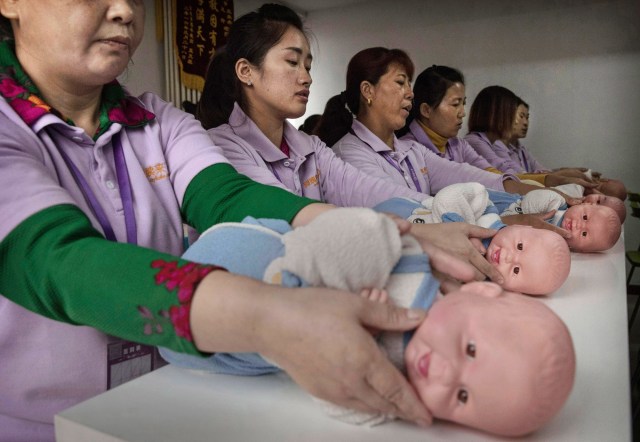Chinese women training to be nannies. Credit: Kevin Frayer / Getty

Over the Chinese New Year holiday two years ago, in a slightly curious move, China Central Television’s documentary channel devoted 18 hours to a twice-nightly documentary series that featured declassified Russian files dating back to the days of Mao Zedong. Since the current Party Secretary, Xi Jinping, insists that the history of the People’s Republic since 1949 is a seamless whole, and the Mao era is not to be repudiated, this clearly was no accident.
It is of some interest, therefore, that included in the broadcast material for the first time was a notorious speech Mao made in Moscow in 1957. In it, Mao mused on topical fears of nuclear war. He was unfazed. “I’m not afraid of nuclear war,” he said. “There are 2.7 billion people in the world; it doesn’t matter if some are killed. China has a population of 600 million; even if half of them are killed, there are still 300 million people left. I’m not afraid of anyone.”
Mao was keen on a large population, not least because, in the early years of the People’s Republic, China had little else: it was a country impoverished by decades of war and famine, followed by Party-directed political violence. Mao sought to make a virtue of China’s population through the mass mobilisation of vast numbers of people — an army of ants equipped only with shovels, to build roads and dams.
That spirit was encapsulated in one of Mao’s short essays that became required reading: The Foolish Old Man Who Moved the Mountain. In it, an old man is so vexed by the mountain that blocks his view that he begins to dig at it. When people mock, he responds that it doesn’t matter how long it takes, he, or his descendants, will move the mountain. It was a metaphor that millions were obliged to enact in grueling physical labour until Mao’s death. Deng Xiaoping, Mao’s pragmatic successor, preferred the strategy of moving the house.
Mao’s approach to China’s development, coupled with the firm socialist conviction that the theories of Malthus were a capitalist fallacy, led him to encourage population growth for the first three decades of the People’s Republic. But by 1976, Mao was dead and China’s population had leapt from just over 500 million in 1949 to 970 million. In 1979, concerned that population expansion might outpace economic development, the Party swung rapidly in the other direction, introducing a coercive ‘one child’ policy.
The policy was brutally enacted for 39 years, with forced late-stage abortions commonplace. There were material rewards and punishments, too: families who complied benefited from better job and housing offers, and higher wages. Those who did not, faced heavy fines and the loss of jobs or other key economic permissions, such as their business licence. Many took evasive action, concealing unlicensed children or, in the more affluent families, choosing to give birth abroad.
China continues to defend the one-child policy, claiming it, among other things, as a contribution to climate change mitigation. But there are grounds to doubt whether its coercive brutality was necessary, since population trends would probably have changed without it. As China’s Asian neighbours entered their own rapid, post-war development, girls received better educational and professional opportunities and large numbers of women entered the paid labour force. Population growth fell at much the same rate that China’s did. Educating and empowering women, it turns out, is as effective as forcing them to abort.
Today, having reaped the economic benefits of a young and mobile workforce, China is suffering the reverse: the country now has the world’s most rapidly ageing population overall, with too few young people entering the labour market and a growing army of retirees who will have to be supported. Since they do not have large traditional families to maintain them, their care will largely fall to a shrinking public purse. Today, the question that haunts China’s planners is, will China grow old before it grows rich?
This has further economic effects: for decades the state benefited from China’s high savings rate as people worried about future health and educational expenses and the state was able to use those savings to invest in infrastructure and other development. Now it needs its people to spend as it tries to shift the economic drivers away from exports towards consumption. The state is trying to encourage more births, but since the majority of the population is now urban, and the costs of raising a child are prohibitive, the take-up has been disappointing. China is entering the dangerous territory of the middle-income trap with no demographic energy behind it.
It does, though, have a young generation that is unlike any previous Chinese cohort: wealthier, more entitled, digital natives, recipients of a highly nationalistic education yet more able to travel and study abroad than any before it. They have little memory or understanding of the traumatic landmarks of the first 30 years of Communist rule, and their spending habits, tastes and desires are keenly studied. They have grown up in a country in which the collective disciplines of family and clan have been drastically weakened, yet they are still expected to carry the moral and financial burden of parents and grandparents, the expectations of up to six elderly people on their shoulders.
The impacts of China’s demographic revolution will play out in profound social and cultural changes for decades. You can already see it in the language. It has mapped family relationships in extraordinary detail, with designations that immediately signal degrees of consanguinity, dynastic ranking and levels of authority in the wider family. These terms, which once dictated the rules of deference, obligation and authority, are now historic curiosities in a society of individuals who have grown up with no siblings, no cousins, and no aunts or uncles.
Generational divides are now profound: among the most tragic is the well-documented emotional alienation of “left behind” children — those rural young whose parents left to work in new factories or construction sites a thousand miles away and were rarely able to return more than once a year. Brought up by elderly grandparents and poorly educated, many have dim prospects themselves.

Young men in these circumstances find it very hard to find a wife, since the one-child policy reinforced a preference for males, and the availability of selective abortion skewed the sex ratio in some provinces as high as 130:100. Today that has produced, in these rural cohorts, a chronic shortage of possible brides.
The numbers are unreliable, since some rural families simply concealed the birth of a girl or gave the child away in order to have another chance at a boy, but official estimates of surplus males over females over the period of the one child policy run at 20-34 million. These poor rural bachelors, in China’s brutally direct parlance, are known as “bare branches”. On top of the personal impacts of enforced bachelorhood, they carry the social stigma of being unable to fulfil their dynastic duty.
On the other side, there are the “left-over women”, also a much-studied phenomenon. These young women have earning power and education and are reluctant to accept traditional attitudes to marriage. Much to the distress of their family elders, they have remained single well past the traditional age of marriage.
This is also a phenomenon visible in China’s prosperous neighbours: in Taiwan, for instance, in some years, the percentage of births to foreign born women has risen as high as 20%, the result of bride importation from poorer Asian countries such as Laos and Cambodia to fill the gap left by educated Taiwanese women who chose not to marry. Today, even with a relaxed population policy, medical technology and preference mean that Chinese newborns still show a distorted gender ratio.
These demographic distortions are deeply worrying for the countries planners. The potential impacts of such a stark gender imbalance on social stability, and the impact of age imbalance on future prosperity could be catastrophic. For decades the regime maintained its legitimacy by delivering rapid economic growth, with cheap labour a key component. But in the new phase of its economic development, with cheap young labour dwindling, China must simultaneously seek cleaner, smarter growth, meet largely unfunded health and pension demands, reform its tax base to increase government revenues and stimulate domestic consumption. For now, though, is growth is fuelled not by increased productivity but by credit expansion, a dangerous phenomenon that cannot continue for ever.
Exact impacts are hard to predict in a world plagued by a US president apparently intent on destroying the existing economic order. It is a world that is also undergoing profound technological transformation, which raises further questions about the skills that will be required in the new economy. That transformation will pose new challenges, but the legacy of China’s dramatic, torturous demography – and the misguided attempts to control it – will continue to impact its social and economic development for decades to come.










Join the discussion
Join like minded readers that support our journalism by becoming a paid subscriber
To join the discussion in the comments, become a paid subscriber.
Join like minded readers that support our journalism, read unlimited articles and enjoy other subscriber-only benefits.
Subscribe